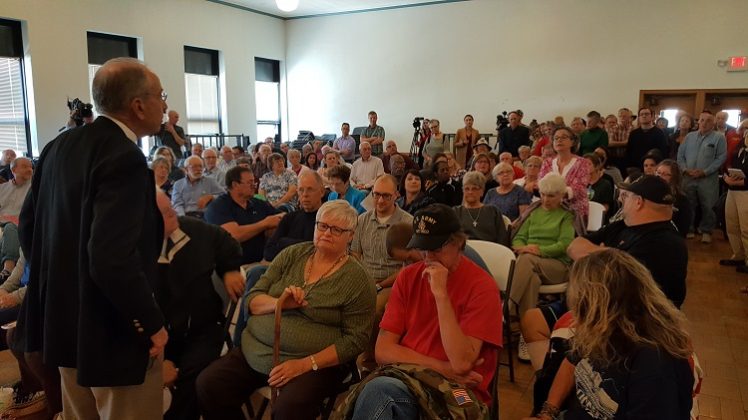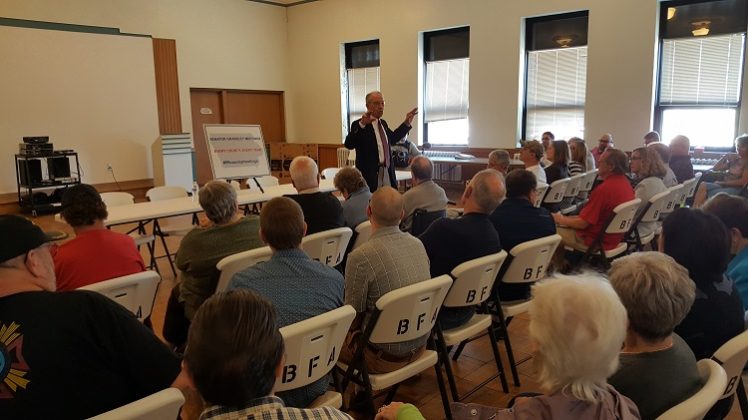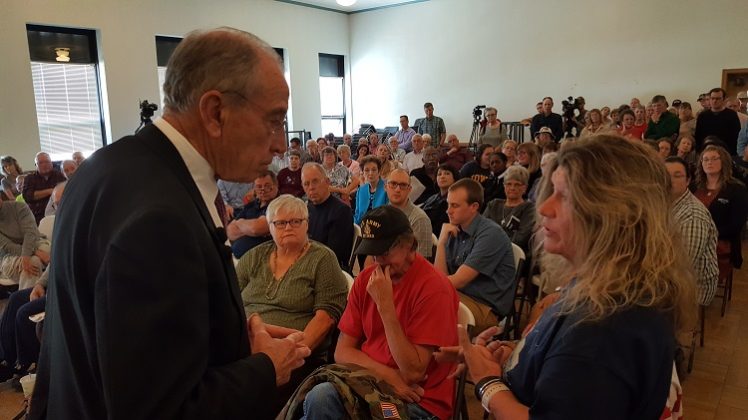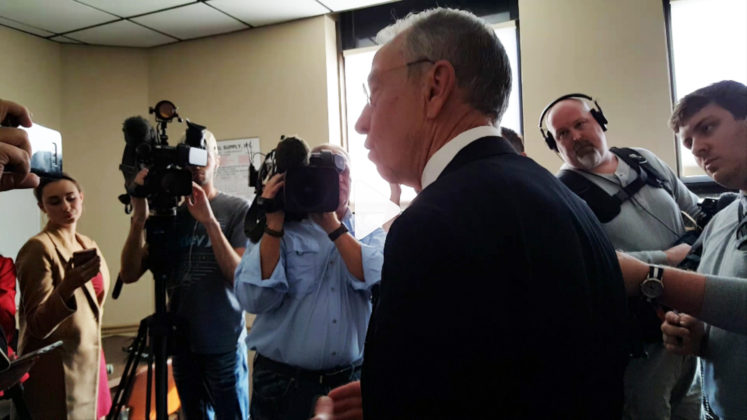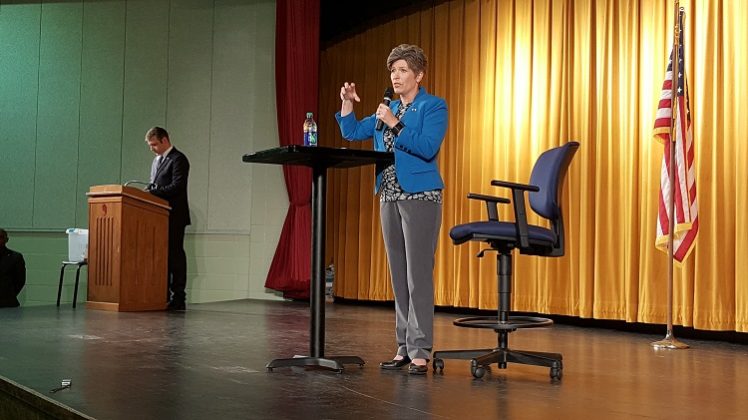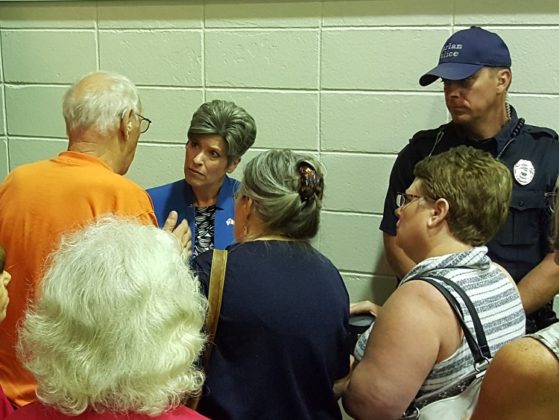BOONE — Anxieties over health insurance dominated the discussion Monday when U.S. Sen. Chuck Grassley wrapped up his 37th annual tour of Iowa’s 99 counties with a stop at the Boone City Hall.
Iowa’s senior senator spoke for an hour with about 100 constituents, fielding questions from all comers. Just as at U.S. Sen. Joni Ernst’s town hall meeting last July in Harlan, the majority of voters’ questions concerned ongoing Republican efforts to wreck Obamacare.
Attention also turned to topical issues such as gun control in the week-old wake of the mass murders in Las Vegas and to U.S. President Donald Trump’s troubling tweets about U.S. Sen. Bob Corker and North Korea leader Kim Jong Un.
Grassley’s meeting was held prior to Thursday’s announcement from the White House of an end to the cost-sharing health subsidies for low-income patients on Obamacare, but uncertainty over the future of the health insurance landscape already loomed large among attendees.
“Aren’t you the Senator who said Obamacare would kill grandma?” said a white-haired man. “And if that’s the case, what do you think Trumpcare is going to do?” His question was followed by applause from the audience and chants of “Medicare for all,” which broke out several times during the meeting.
“There’s probably a lot of support in this room for (Medicare for all),” Grassley said. “But the trustees for Medicare meet every spring and issue a report, and they say by 2029 there won’t be any money for Medicare if Congress doesn’t step in and do something about it. So if we had Medicare for all, it would go broke before — .”
The rest of Grassley’s answer was drowned out by sustained booing from the audience. The senator’s largest campaign donors since 1989 have been the insurance industry ($1.6 million) and health professionals ($1.5 million), according to OpenSecrets.org.
Grassley distanced himself from the language of “repeal and replace” that was often heard before Congress’ repeated failure to pass health insurance reform legislation over the summer.
“A lot of Obamacare will stay in place,” Grassley said, “so I think it would be more accurate to say that we’re amending Obamacare. Is it okay with you if I say that the word ‘repeal,’ even if we use it, isn’t a very accurate term to use?”
Monica Peitz of Perry asked Grassley a question about the Graham-Cassidy bill, the Senate’s last-ditch effort in late September to repeal Obamacare. Someone in the televised debate on the bill referred to “the long bureaucratic arm of the government regulating a person’s healthcare decisions,” Peitz said, “and I guess I’m not sure what that long bureaucratic arm is. My assumption is that’s the person responsible for carrying out whatever government regulations have been passed regarding healthcare. Could you explain to me how a manager in an insurance company who’s supposed to be making profits for his investors would make better decisions regarding my healthcare than the official charged with carrying out the government regulations that are established by our elected representatives?”
Peitz was probably referring to Sen. Bill Cassidy (R-La.), who said of the Affordable Healthcare Act’s individual mandate that “the long arm of the government is going to grab you and penalize you and shake you until you pay it.” According to Cassidy, “When the bureaucrat has the power, it first serves the bureaucrat.”
In the same debate, Sen. Lindsey O. Graham (R-S.C.), who co-sponsored the bill with Cassidy, said that “if you want Medicare for all, you’re going to wind up with Medicare for nobody. You’ll have a card without a real choice. Don’t consolidate all your hopes and dreams for your family into the arms of the federal government, because it’s not going to work.”
In answer to Peitz, Grassley drew a distinction between “the government” and “the bureaucrats,” which in other contexts has appeared to be a distinction without a difference.
“Since the insurance companies have to abide by the same laws that the bureaucrats have to carry out, is it easy to make a differential between what the bureaucrats say and what the government says the insurance companies have to do?” Grassley said. “But beyond that, I wonder if the long arm of the federal government isn’t referring to, under Obamacare, so many decisions being made in Washington, D.C., whereas (Cassidy’s) plan was leaving more to the states to make a decision. He was turning over more authority to the states, and so he was trading Des Moines for the long arm of the federal government is the point I think he was trying to make.”
On the question of empowering the states in matters of health insurance, Grassley was answered by a woman with experience of Iowa’s recent Medicaid privatization.
“If you’re not aware of it, our state is screwed up with healthcare by their privatizing it,” the woman said, “so who wants the state of Iowa to tell us what we want for healthcare?”
In a series of talking points, Grassley outlined his reasons for supporting Republican efforts to repeal and replace Obamacare.
“I believe that one size fits all, like the present healthcare law, having everything decided in Washington and limiting to four different insurance plans, doesn’t give enough different choices for different people,” Grassley said. He said “that we ought to give more choice, have people buy the health insurance that they want to buy, and the insurance companies ought to be able to sell health insurance that people want to buy. See that it is accessible and affordable. To see less government decision making in healthcare, not coming between you and your doctor, to probably have less decision making in Washington and more from the states. More emphasis upon the marketplace and less upon government regulation. More transparency so you know what everybody charges, and they ought to charge you the same whether you’re a millionaire or poor because they charge poor people more now than they do people who have health insurance. That’s very unfair.”
Turning to the issue of assault weapons used in mass murders, a questioner asked Grassley “to use your influence and your position in the Senate to stop the flood that we have going on in our country today with military-style equipment being used that’s not needed for self-defense, that’s not needed for hunting.”
With her voice breaking into sobs, the woman said, “They are killing our families and our children, and I don’t want to have to live in that kind of world.”
Grassley said it was unlikely changes in gun laws would be made in the wake of the Las Vegas mass murders due to Republican domination of Congress, and he does not believe gun laws will not prevent gun deaths or gun-related violence.
“When it comes to what happened in Las Vegas,” he said, “and all the talk we’ve had about Second Amendment issues, I haven’t had one person suggest to me that any law we could pass would have prevented what happened in Las Vegas.”
While Grassley elsewhere said that improved mental care would reduce gun violence, he also voted Feb. 15, 2017, in favor of legislation to expand gun access for the mentally impaired. In a spirit reminiscent of former U.S. Senator Tom Harkin (D-Iowa), Grassley said the previous ban against mentally ill individuals purchasing guns was “an affront to the Second Amendment rights of people with disabilities.”
“Respect for the Constitution and the Second Amendment is an important part of the Constitution,” Grassley said to his constituents in Boone.
Foreign policy was also a concern to Grassley’s constituents. One man asked, “With all the back and forth between the leader of North Korea and the U.S. president, what are you going to do to insure that the current U.S. president does not abandon all forms of diplomacy and decide that war is the best option?”
Grassley said the U.S. “should always use diplomacy first.” He said that “such a military action would be catastrophic, without a doubt.”
Following up, a woman said, “Senator, I am deeply worried about the competency of this president, who I do not believe should have the nuclear trigger. So much depends on you and other senators.”









